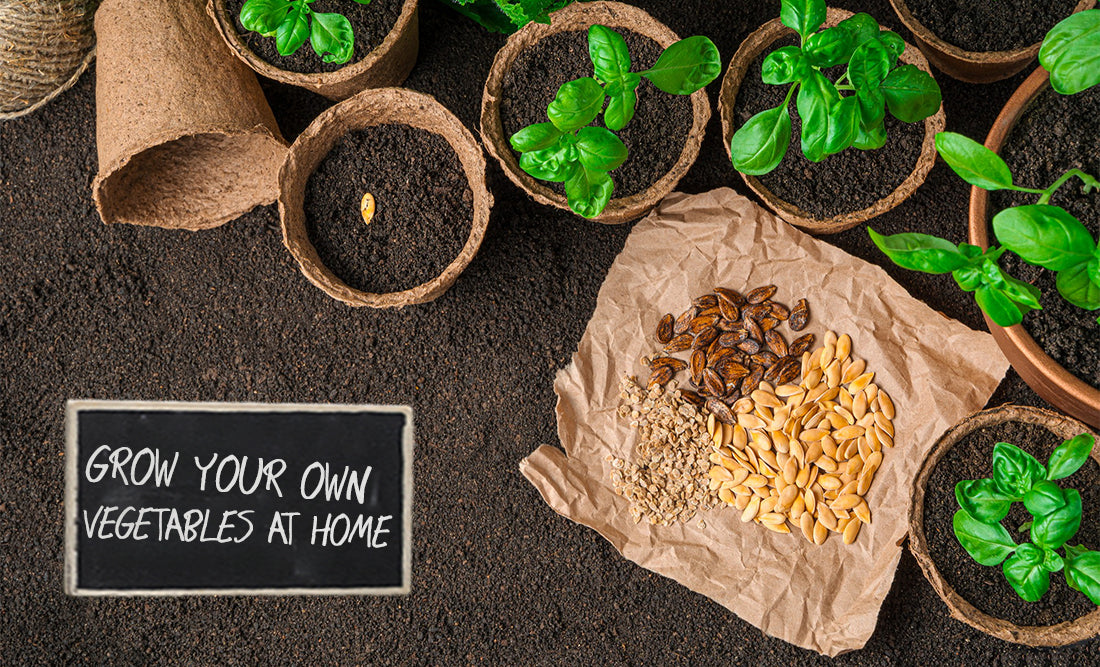Growing your own vegetables from seed is not only a fulfilling hobby but also a sustainable way to enjoy fresh, nutritious produce right from your own backyard. In this guide, we'll delve into the art of cultivating vegetables easily in your home garden, starting with the fundamental step of planting vegetable seeds. From selecting the right seeds to nurturing them into thriving plants, we'll explore techniques and tips to ensure success. Get ready to witness the miracle of life as you cultivate your own vibrant vegetable patch from seed to harvest!
What are Vegetable Seeds for Gardening?
Vegetable seeds are tiny sprouts that have the potential to produce delicious and nutritious food. These seeds come in various shapes, sizes, and colors, each representing a different vegetable variety. From the humble tomato seed to the big pumpkin seed, there's a range of options to choose from when planning your garden.
The best part is that you get what you sow. If you want 100% organic and natural vegetables in this contaminated world, you can sow vegetable seeds in your garden and get an organic result.
How is it Different from Farming Vegetables?
Growing vegetables at home differs from farming vegetables in several ways. Firstly, the scale of operation is vastly different. Farming vegetables often involves large plots of land and machinery, whereas home gardening typically occurs in smaller spaces like backyard gardens or containers on balconies.
Secondly, the goals of each endeavor vary. While farming vegetables is often done for commercial purposes, with a focus on maximizing yield and profit, home gardening is more about personal enjoyment and self-sufficiency.
When you use vegetable seeds for home gardening, it offers simplicity and accessibility. With seeds, you have direct control over the entire growing process, from seed to harvest. This straightforward approach allows even beginners to confidently grow a wide range of vegetables right in their own backyard or balcony. If you are also interested in growing herbs at home you can also refer to herb seeds.
Benefits of Growing Vegetables at Home:
- Freshness and Flavor: Homegrown vegetables are unmatched in terms of freshness and flavor. Picked at the peak of ripeness, they retain maximum nutrients and taste.
- Cost Savings: Another advantage of home gardening is the potential for cost savings. By growing your own vegetables, you can slash your grocery bill and stretch your budget further. With just a small investment in seeds, soil, and basic gardening supplies, you can enjoy a bountiful harvest of fresh produce throughout the growing season, all without breaking the bank.
- Connection to Nature: Gardening offers a profound connection to the natural world, fostering a sense of mindfulness and relaxation. As you tend to your vegetable seeds, you'll find yourself immersed in the rhythms of the seasons, attuned to the subtle changes in weather, soil, and plant growth.
- Environmental Impact: Growing your own food at home also has positive environmental implications. By reducing reliance on commercially grown produce, you're helping to lower carbon emissions associated with transportation and packaging.
- Educational Value: Finally, home gardening offers invaluable educational opportunities for both children and adults alike. Through hands-on experience, gardeners of all ages can learn about the life cycle of plants, the importance of healthy soil, and the interdependence of ecosystems.
Easy Tips for Growing Vegetables at Home:
- Start with the Right Seeds: Choose high-quality vegetable seeds suited to your climate and growing conditions. Look for reputable seed suppliers, or consider saving seeds from your favorite vegetables.
- Prepare the Soil: Ensure your garden soil is well-draining, nutrient-rich, and free from weeds. Amend the soil with compost or organic matter to improve its texture and fertility.
- Provide Adequate Sunlight: Most vegetables thrive in full sunlight, so select a sunny spot for your garden beds or containers.
- Water Consistently: Establish a regular watering schedule to keep your vegetable plants adequately hydrated. Aim to water deeply and evenly, avoiding both drought stress and waterlogging.
- Monitor for Pests and Diseases: Watch for signs of pests or diseases, such as yellowing leaves or nibbled foliage. Implement integrated pest management techniques and practice crop rotation to minimize issues.
- Harvest with Care: Harvest your vegetables at the peak of ripeness for the best flavor and nutritional content. Use sharp pruners or scissors to avoid damaging the plants.
- Continuous Care: Gardening is a continuous process, so stay attentive to your plants' needs throughout the growing season. Regular maintenance tasks such as weeding, mulching, and fertilizing will help ensure a successful harvest.
Conclusion
Growing vegetables at home from seeds is a gratifying action that allows you to enjoy gardening while reaping the rewards of fresh, flavorful produce. By following the tips outlined in this guide and nurturing your plants with care, you'll be well on your way to cultivating a thriving home garden that brings joy and sustenance year-round. Happy gardening!

